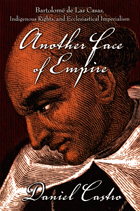4 start with A start with A

The scholar-editors and eight accomplished colleagues together offer views of phonological research on American Spanish.

Separating historical reality from myth, Daniel Castro provides a nuanced, revisionist assessment of the friar’s career, writings, and political activities. Castro argues that Las Casas was very much an imperialist. Intent on converting the Indians to Christianity, the religion of the colonizers, Las Casas simply offered the natives another face of empire: a paternalistic, ecclesiastical imperialism. Castro contends that while the friar was a skilled political manipulator, influential at what was arguably the world’s most powerful sixteenth-century imperial court, his advocacy on behalf of the natives had little impact on their lives. Analyzing Las Casas’s extensive writings, Castro points out that in his many years in the Americas, Las Casas spent very little time among the indigenous people he professed to love, and he made virtually no effort to learn their languages. He saw himself as an emissary from a superior culture with a divine mandate to impose a set of ideas and beliefs on the colonized. He differed from his compatriots primarily in his antipathy to violence as the means for achieving conversion.

The Art of Teaching Spanish explores in-depth the findings of research in second language acquisition (SLA) and other language-related fields and translates those findings into practical pedagogical tools for current—and future—Spanish-language instructors. This volume addresses how theoretical frameworks affect the application of research findings to the teaching of Spanish, how logistical factors affect the way research findings can be applied to teach Spanish, and how findings from Spanish SLA research would be applicable to Spanish second language teaching and represented in Spanish curricula through objectives and goals (as evidenced in pedagogical materials such as textbooks and computer-assisted language learning software).
Top SLA researchers and applied linguists lend their expertise on matters such as foreign language across curriculum programs, testing, online learning, the incorporation of linguistic variation into the classroom, heritage language learners, the teaching of translation, the effects of study abroad and classroom contexts on learning, and other pedagogical issues. Other common themes of The Art of Teaching Spanish include the rejection of the concept of a monolithic language competence, the importance of language as social practice and cultural competence, the psycholinguistic component of SLA, and the need for more cross-fertilization from related fields.

At the Moon’s Inn, first published in 1941, provides a fictional account of De Soto’s famous Spanish expedition to La Florida and through the southeastern United States between 1539 and 1543. The novel begins in Spain in 1538, where De Soto and his chief lieutenants, veterans of the campaigns in South America, pledge themselves to a new enterprise to explore and exploit La Florida. The narrative follows them on their voyage to Cuba, where they rest and obtain additional supplies, then set sail for the area now known as Tampa Bay. Lytle’s brilliant historical novel takes the readers with the conquistadores through the hot, humid land, where despite their advantage in military technology they found they must rely on the Indians for food. The author explores the cultural confrontation that seriously weakened the Indians, while the Spaniards’ dreams of gold gradually turned to hopes of survival in the hostile environment.
Drawing his facts from the 1939 United States De Soto Commission Report and from the surviving historical chronicles of the expedition, Lytle weaves a fascinating tale that brings to life the history of Spanish efforts to establish a controlling presence in the New World during the first half of the 16th century.
In his introduction, Douglas Jones places At the Moon’s Inn within the context of the documentary record, as well as within the framework of its distinguished author’s career.
READERS
Browse our collection.
PUBLISHERS
See BiblioVault's publisher services.
STUDENT SERVICES
Files for college accessibility offices.
UChicago Accessibility Resources
home | accessibility | search | about | contact us
BiblioVault ® 2001 - 2025
The University of Chicago Press









